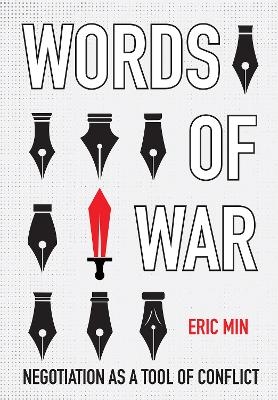
Words of War
Negotiation as a Tool of Conflict
Seiten
2025
Cornell University Press (Verlag)
978-1-5017-7922-0 (ISBN)
Cornell University Press (Verlag)
978-1-5017-7922-0 (ISBN)
- Noch nicht erschienen (ca. Februar 2025)
- Versandkostenfrei
- Auch auf Rechnung
- Artikel merken
In Words of War, Eric Min pulls back the curtain on when, why, and how belligerents negotiate while fighting.
Of all interstate conflicts across the last two centuries, two-thirds have ended through negotiated agreement. Wartime diplomacy is thus commonly seen as a costless and mechanical process solely designed to end fighting. But as Min argues, that wartime negotiations are not just peacemaking tools. They are in fact a highly strategic activity that can also help states manage, fight, and potentially win wars.
To demonstrate that wartime talk does more than simply end hostilities, Min distinguishes between two kinds of negotiations: sincere and insincere. Whereas sincere negotiations are good faithhonest attempts to reach peace, insincere negotiations exploit diplomacy for some other purpose, such as currying gaining political support or remobilizing forces. Two factors determine whether and how belligerents will negotiate: the amount of pressure that outside parties can place on belligerents them to engage in diplomacy, and information obtained from fighting on the battlefield.
Combining statistical and computational text analyses with qualitative case studies ranging from the War of the Roman Republic to the Korean War, Min shows that negotiations are more likely to occur with strong external pressures. A combination of such pressures and indeterminate battlefield activity, however, will most likely leads to insincere negotiations that may stoke fighting rather than end it. By revealing that diplomacy can sometimes be counterproductive to peace, Words of War compels us to rethink the assumption that it "cannot hurt" to promote diplomacy during war.
Of all interstate conflicts across the last two centuries, two-thirds have ended through negotiated agreement. Wartime diplomacy is thus commonly seen as a costless and mechanical process solely designed to end fighting. But as Min argues, that wartime negotiations are not just peacemaking tools. They are in fact a highly strategic activity that can also help states manage, fight, and potentially win wars.
To demonstrate that wartime talk does more than simply end hostilities, Min distinguishes between two kinds of negotiations: sincere and insincere. Whereas sincere negotiations are good faithhonest attempts to reach peace, insincere negotiations exploit diplomacy for some other purpose, such as currying gaining political support or remobilizing forces. Two factors determine whether and how belligerents will negotiate: the amount of pressure that outside parties can place on belligerents them to engage in diplomacy, and information obtained from fighting on the battlefield.
Combining statistical and computational text analyses with qualitative case studies ranging from the War of the Roman Republic to the Korean War, Min shows that negotiations are more likely to occur with strong external pressures. A combination of such pressures and indeterminate battlefield activity, however, will most likely leads to insincere negotiations that may stoke fighting rather than end it. By revealing that diplomacy can sometimes be counterproductive to peace, Words of War compels us to rethink the assumption that it "cannot hurt" to promote diplomacy during war.
Eric Min is Assistant Professor of Political Science at the University of California, Los Angeles.
Time to Talk
A Theory of Wartime Negotiations
Quantifying Two Centuries of War
Fighting to Talk
Talking to Fight
The First Arab-Israeli War
The "Talking War" in Korea
Time to Stop Talking
| Erscheint lt. Verlag | 15.2.2025 |
|---|---|
| Reihe/Serie | Cornell Studies in Security Affairs |
| Zusatzinfo | 1 Charts; 18 Graphs; 6 Maps |
| Verlagsort | Ithaca |
| Sprache | englisch |
| Maße | 152 x 229 mm |
| Gewicht | 907 g |
| Themenwelt | Recht / Steuern ► EU / Internationales Recht |
| Sozialwissenschaften ► Politik / Verwaltung ► Staat / Verwaltung | |
| ISBN-10 | 1-5017-7922-2 / 1501779222 |
| ISBN-13 | 978-1-5017-7922-0 / 9781501779220 |
| Zustand | Neuware |
| Informationen gemäß Produktsicherheitsverordnung (GPSR) | |
| Haben Sie eine Frage zum Produkt? |
Mehr entdecken
aus dem Bereich
aus dem Bereich
Organisationen steuern, Strukturen schaffen, Prozesse gestalten
Buch | Softcover (2024)
Rehm Verlag
CHF 53,20


